 I’m over at the Contemporary Romance Cafe, discussing a big surprise about going to writing full time.
I’m over at the Contemporary Romance Cafe, discussing a big surprise about going to writing full time.
Tag: writing advice
Writing to the Market – Is It *Always* Anathema?
 This is like one of those “Can you spot the X?” photos. Can you spot the quail in this pic? While the others in the covey are scratching around and eating, one will get in a high spot and be the lookout for predators. At first I thought I hadn’t gotten a good photo – several were out of focus – and then I zoomed in and wow!
This is like one of those “Can you spot the X?” photos. Can you spot the quail in this pic? While the others in the covey are scratching around and eating, one will get in a high spot and be the lookout for predators. At first I thought I hadn’t gotten a good photo – several were out of focus – and then I zoomed in and wow!
Love how he’s looking right at me, too. 
I’m over at Word Whores today, talking about when you *should* write to the market.
Five Ways to Combat Bad Writer Habits
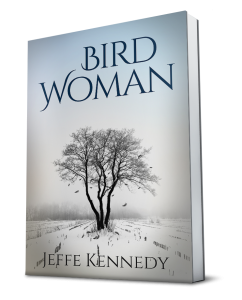
This week I put out on Amazon a short read. It’s a true story I wrote some time ago, that was originally published in a literary magazine, about one of the most unsettling experiences of my life. A brush with the unseen that I don’t care to repeat!
At Word Whores this week, our topic is “My Bad Habit as a Writer.”
Which took some thinking about, really. Not that I’m ALL THAT or anything… but I have rather ruthlessly weeded out my bad habits over the many years. Like… twenty years. And I’m still a work in progress, which I suppose is part of the point. So, rather than focus specifically on my own bad habits, former, existing or future, I thought I’d give five ways that I’ve developed to identify and eliminate bad habits.
Five Things I’d Tell My Newbie Writer Self

This is our neighborhood roadrunner. She comes by fairly frequently and checks things out. Not easy to get a good pic of her either! This isn’t the best shot I got (too much background, not *quite* in focus), but I love how it captures her purposeful stride.
Also, if you haven’t yet read THE MARK OF THE TALA, it’s on sale at Amazon for only $2.51. Great time to pick up a copy!
Jeffe’s #1 Tip for Being a Good Blogger
 I love seeing the mountain bluebirds come around this time of year. They’re skittish birds though, so it’s hard to get a good shot. I’ve been leaving the tripod up with telephoto lens trained on their usual perches. Even so, this is about the best pic I’ve gotten. Mostly they’re a whirl of bright blue and rose amidst the snowflakes.
I love seeing the mountain bluebirds come around this time of year. They’re skittish birds though, so it’s hard to get a good shot. I’ve been leaving the tripod up with telephoto lens trained on their usual perches. Even so, this is about the best pic I’ve gotten. Mostly they’re a whirl of bright blue and rose amidst the snowflakes.
I wrote a blog post early this week that was a bit meta – on how to write a bad blog post. Maybe that was a good example of a bad blog post because only one person commented!
At any rate, I’ve had a note for a while to share one of my blogging tricks. Not that I claim to be a great blogger or anything, but sometimes people ask me how I come up with topics. My secret? I keep a list. I have an ongoing list in Word of various topics, and I add to it as things occur to me. Sometimes I make notes in my phone or tablet and transfer them to the main list.
The most important thing I (try to) do, and this is really key for writers, is I note topics that apply to the book as I’m writing it. You will love your past self for doing this when it comes time to write those promo blog posts. If you’ve been there, you know. It can get really difficult to think up interesting things to say about your published book. Having this list of things you researched, what gave you images or ideas, problems you encountered, people that offered needed obscure information – and so forth.
All of these things will make great blog topics in the future, all that you would likely never remember months or a year later, depending on your publishing schedule.
Short and easy tip there, but one I’d had on my list for a while. 😀
Happy weekend, everyone!
Writing in Books – Do You Do It?
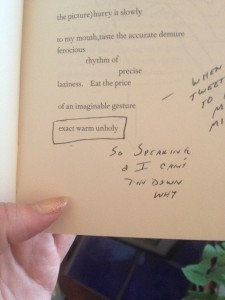 I’m over at the Contemporary Romance Cafe, giving some writing advice, and talking about why we do and don’t write in books we’re reading.
I’m over at the Contemporary Romance Cafe, giving some writing advice, and talking about why we do and don’t write in books we’re reading.
Boosting Creativity by Ditching the Video Poison
 I’m back from a lovely Thanksgiving holiday and buckling down to seriously crank on THE EDGE OF THE BLADE. Since I’ve been writing full-time, I haven’t consistently hit the hit word count goals I’d like to. In fact, I’ve felt like I’ve been writing more slowly since summer and I haven’t been sure why.
I’m back from a lovely Thanksgiving holiday and buckling down to seriously crank on THE EDGE OF THE BLADE. Since I’ve been writing full-time, I haven’t consistently hit the hit word count goals I’d like to. In fact, I’ve felt like I’ve been writing more slowly since summer and I haven’t been sure why.
(Though I told writing buddy Anne Calhoun that I felt like I spent all of July sitting in the grape arbor, doing nothing, and she said, “Amen, sister,” so it might not be just me.)
Still, I’ve got a January 1 deadline for this book, so I’m out of arbor-dawdling time. Plus it’s too cold out for that. So, on the drive home yesterday, I constructed a new daily schedule and looked hard at where I could improve productivity. And I realized a Huge Thing. In midsummer, I stopped listening to music while I ran on the treadmill in the mornings, and started watching videos on my iPad mini instead.
There were good reasons for this at the time. I was doing very particular research and watching the videos killed two birds with one stone – entertained me while I ran and provided time to watch the stuff I needed to. After that, I kept going, watching various musicals, as I could find and stream them.
No harm done, right?
WELL.
A lot of you know I gave up watching TV a long time ago. Wow, like almost twenty years ago, we ditched the cable, happy to save that money. The cost savings was a side-benefit, however. My main reason was because of something I read in Stephen King’s ON WRITING. I was trying to work out how to be a writer and consumed all sorts of craft books like that one. I’m paraphrasing here because I can’t find my copy (did YOU borrow it??), but he said that it’s no accident he grew up without TV and became such a vivid creative writer. He called TV poisonous to creativity and urged all writers to give it up.
So, I did. It was a pretty easy choice for me, as the sound of the TV going in the background always irritated me. I was born to a mother who claimed the way to meet the ideal man would be in the Tattered Cover Bookstore during a Broncos game. Fortunately the man I had found (though not in Tattered Cover) fully supported the idea. My teenage stepdaughter not so much, but she was gracious about it.
And it worked!
At least, I felt like it did. Enhancing creativity in oneself is not a clear-cut enterprise that can be measured quantitatively. However, over the years, we never regretted the move, and often counted our blessings not to be subjected to the sensationalized news and pharmaceutical advertising so many complained of. As time passed, we were able to access Netflix and Internet streaming. We watch a lot of movies and sometimes TV series. No more than one movie or two episodes of a show each evening, after my writing day was over.
Until I started on my video-watching while running kick. Could that have impacted my creativity and productivity? Surely not! And yet… the timing worked out.
So, today I went back to running to music. And my productivity zoomed up. Maybe that’s a coincidence. Maybe it won’t be reproducible. Still, I believe that watching those videos before my morning writing put my creative mind in the wrong mode. Music it is, from now on.
Something to consider, if you’re struggling with ways to clear your writing mind!
When to Listen to Advice – and When NOT to!
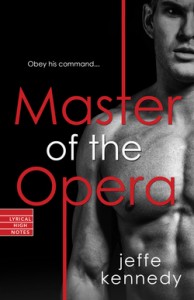 Those of you who’ve waited (nearly forever!) for a consolidated version of my serial novel, MASTER OF THE OPERA, it starts shipping from Books a Million tomorrow. It’s in paper only. If you want to read it digitally, you still have to by each of the six episodes separately. Good news is that the first episode is FREE. So you can try it out and see if you like the story – then go for digital or paper, as you please.
Those of you who’ve waited (nearly forever!) for a consolidated version of my serial novel, MASTER OF THE OPERA, it starts shipping from Books a Million tomorrow. It’s in paper only. If you want to read it digitally, you still have to by each of the six episodes separately. Good news is that the first episode is FREE. So you can try it out and see if you like the story – then go for digital or paper, as you please.
Other housekeeping items:
The second New Release Newsletter from the Science Fiction and Fantasy Writers of America (SFWA) goes out tomorrow! Subscribe to learn about new releases from the best-selling Sci Fi and Fantasy writers out there, AND have a chance to win free books! You can sign up here.
Also, I’m teaching an online class on writing sex scenes starting tomorrow. Getting Away from Wham, Bam, Thank You, Ma’am – only $15 for non-members of OIRWA!
Now, on to what you really came here for. A bit of a rant on listening to advice.
So, yesterday I was at my nail salon, getting a manicure. The place is run by two Vietnamese sisters and their husbands. The sisters sit next to each other (which I find fascinating, but that’s another story) and my gal’s sister was doing the nails of a lady who must be a lawyer. The sister’s husband took notes as lawyer gal gave them advice on dealing with a construction/contractor problem on their house. She told them exactly what to say, how to say it and when to escalate.
It was all really good advice and they were lucky that she shared it so freely.
That said, not all advice is good advice. Free or purchased.
The thing to remember is that people LOVE to give advice. I’m not exactly sure why, because it can be a time suck and often you can put a lot of effort in trying to give thorough, solid advice and then the person who asked doesn’t listen. Of course, there are plenty of people who try to make careers of advice-giving. Those are the ones who charge huge amounts to teach you how to write a bestseller or how to be a millionaire. (I’m cynical – I always want to know why they aren’t making money by writing bestsellers or making millions a different way.)
Hopefully this isn’t ironic, given that I pimped my online course above. 😀 However, I didn’t teach writing or give writing advice for a really long time – until I thought I had something solid to give. And my point today goes beyond writing advice, though it certainly centers there. My author loops are full of people offering their opinions, sometimes insisting on the rightness of their advice and battling others to “win.” A dubious trophy, at best. Twitter has the #pubtip hashtag which *anyone* can toss up there – which means the advice can be good or atrocious. Very often the latter.
And people’s friends and families – usually well-meaning – give tons of advice. A newbie writer messaged me recently, apologetically asking for advice on querying agents, etc. I was happy to answer her questions, as she asked very nicely and has supported my books. I was sorting through a bunch of misinformed ideas she had, when she mentioned that her family had told her a bunch of it, particularly regarding the publishing industry and self-publishing. I had to tell her to stop listening to her family. I’m sure they’re lovely people, but their “advice” seemed to be entirely drawn from skewed media stories. Not that self-publishing isn’t a viable option – of course it is. But what the media likes to broadcast and what’s the real scoop can be two wildly different critters.
My point is that, with all things, when listening to advice, consider the source – particularly their motivation and their experience.
As I mentioned above, people have a wide range of motivations for giving advice. Some of the time it’s to make money off of people, which is at least straightforward. A whole bunch of the time it’s to feed their egos. Spreading advice and opinions is a great way to pump up one’s feeling of self-worth and mastery of a topic. I’m sure I’m guilty of this from time to time, but mostly I try to restrain myself to giving advice only when I think it’s because it can be helpful. I believe this is the only motivation to trust.
As far as experience, there’s a Catch-22 in that the people with the most experience and the best advice to give are frequently way too busy to give it. Beware of people with so much free time that they can spend it giving lots of advice. Conversely, when someone with lots of experience in a subject offers you advice, listen to it! The lawyer next to me at the salon knew her stuff. The advice she gave was probably worth $500 and hour and she gave it for free – or maybe for the price of a manicure – and they listened diligently. I’d even add that the advice is particularly valuable if it contradicts ideas you already had. That doesn’t mean you have to take it – but it does mean you’ve been given something you didn’t have before.
And that’s my advice. For what it’s worth. 😀
Happy weekend, everyone!
Learning My Own Lessons
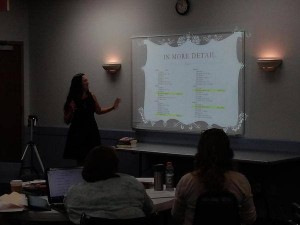 A couple of weeks ago, I had the fabulous and fun privilege of flying out to St. Louis to teach a workshop to the Missouri Romance Writers of America (MORWA). They asked me to talk about structuring a serial novel, largely because of this terribly geeky blog post I wrote about it. (I think that’s a data point right there when people ask if writing blog posts is meaningful at all. Just saying.)
A couple of weeks ago, I had the fabulous and fun privilege of flying out to St. Louis to teach a workshop to the Missouri Romance Writers of America (MORWA). They asked me to talk about structuring a serial novel, largely because of this terribly geeky blog post I wrote about it. (I think that’s a data point right there when people ask if writing blog posts is meaningful at all. Just saying.)
In order to explain my method of structuring a serial novel, I started with the basic structure I use to structure any work. We talked quite a bit about the Three-Act Structure, where Act 1 is the first 25%, Act 2 is the middle 50%, going up to 75% through, with Act 3 being the final 25%. As with many RWA chapters – and one of the things I love about RWA – the members ranged from newbie writers stretching their muscles for the first time up to award-winning pros. So, as I was going over this structure pretty fast, in order to lay the foundation for the rest, I threw out that you know you’ve finished Act 1 because all the stakes are set. And that a solid first 25%, done correctly, will prevent the middle of the book from “sagging” or losing momentum. If you’re having problems with the middle 50%, go back and look at the first 25% and make sure you truly set all the stakes.
One of the newbies put up her hand and asked what that meant, to have the stakes set. Always a good reminder to me that stuff I take for granted at this point isn’t second nature to others.
I explained that the first 25% should introduce the characters, who they are, what they want and why they can’t have it. Some talk about the Three-Act Structure being that you get your protagonist up a tree in Act 1, throw rocks at them in Act 2 and get them down again by the end of Act 3. Setting the stakes is getting your hero or heroine firmly up in that tree.
So, I’m back home and fully plunged into writing THE PAGES OF THE MIND, which is Dafne’s book, the fourth in my Twelve Kingdoms series. In order to meet deadline, I’ve set myself what is for me a fairly grueling pace of 2,200 words/day, six days/week. As I have a full-time day job, that’s about the most I can do consistently. Some days I do more in the time I have, some days considerably less. The considerably less days are the ones where I circle back and revise or add to previous scenes. (Adding is nearly *always* involved.) I write my books beginning to end, so I really hate circling back like that. It feels like I’m not making progress.
I was getting all frustrated with myself this week about it.
Guess where I’m at? Yeah – 26,000 words, which for those who don’t speak math, is right at 25% of what will probably be about a 105,000 word book. (Most novels are 80,000-120,000 words. Fantasies like this can be on the longer end of the spectrum.)
It hit me sometime yesterday, that OF COURSE I’m doing a lot of circling back, layering and tweaking. I’m setting the stakes for the rest of the book! Once my Act 1 is solid, the rest will fall into place more easily. I know this. I freaking taught people about this a couple of weeks ago.
How easily we forget.
I’m feeling much better now!
Speaking of The Twelve Kingdoms, we’re kicking off the blog tour (heh – I first typed “bog tour,” which isn’t nearly so fun) for THE TALON OF THE HAWK. Today there’s a very juicy excerpt – one of my favorite scenes! – at the Chosen by You Book Club. Let me know if you like it, too. Hee hee hee.
Also, the Science Fiction and Fantasy Writers of America (SFWA) is starting a bimonthly (every two months, not twice a month) newsletter of members’ new releases. I think it will be great! You can subscribe here.
Have a great weekend everyone!
What Would You Write If You Weren’t Afraid?
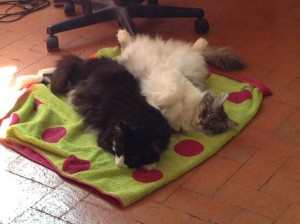 I saw this question go by on Twitter a bit ago and, as things seem to do at certain times, it really struck me. I can’t recall who posted it – if it was you, please say so and I’ll give you credit!
I saw this question go by on Twitter a bit ago and, as things seem to do at certain times, it really struck me. I can’t recall who posted it – if it was you, please say so and I’ll give you credit!
Some of you out there will be shaking your heads at me and joyfully proclaiming that you are not afraid. I know you are because some people said that back to me on Twitter. You write exactly what you want to write and screw the rules! Screw the critics, the gatekeepers and reader feedback!
Good on you!
I mean that seriously. It’s a great place to be. I used to be there and I miss it.
And probably “afraid” isn’t exactly the right word for what I feel at this point in my career. It’s more an umbrella sense of caution, of all the voices in my head, whispering as I write. With newbie authors I’ve often given the advice to throw people out of the room who are metaphorically looking over their shoulders. I think pretty much every one of us has to figure out how to overcome that in the early days – writing sex scenes that would shock your grandmother, expressing opinions your dad would have a fit about, starting a sentence with a conjunction which would have been points off in AP English. That’s a big challenge and not easy to do.
Then you get past that – you have to, if you’re going to free up your writing voice – and you write books and everything goes swimmingly for a while.
Until you find yourself writing book four of a popular series that straddles genres in a way that’s generating a lot of interest and discussion and suddenly new, different and LOUDER people are in the room with you. I’m hearing voices I never heard before about the marketplace, what my agent thinks, what my editor expects, what my author friends are saying, what reviewers identify as ways I need to grow as a writer or how I do or don’t fit within the genre. These voices are in many ways much more difficult to shut up because I have respect for their opinions. This isn’t my grandmother reiterating an uneducated attitude. These are smart people with intelligent things to say.
Things that can get in the way.
I heard this before, when I was a newbie writer, and professional writer friends advised me to enjoy that time. They said there’s a freedom to writing then that you lose later, when you have expectations laid on you from people like editors, agents and so forth. Naturally, I barely listened, caught up in my envy for their book contracts and success. But they were spot on correct.
I think it comes down to this – that I’m not always writing what I would if I didn’t have those expectations. Or rather, more accurately, writing what I would if I didn’t have those voices is more of a battle.
I want to write what I’d write if I wasn’t afraid, if I didn’t anticipate the reactions to the book it will become. So I’m focusing on this question. As I’m spinning the story, when I hit a decision point and the voices rise up, chattering about how other authors did it, what the market wants, what the award-givers will value, I ask myself how I’d do it if I weren’t afraid of their censure.
And I do that.
It’s an ongoing process. A lesson I feel like I’m learning anew every day, with every writing session. Maybe this is part of growing as a writer in this stage of my career – finding ways to stay true to my own storytelling in the face of more and more people having an investment in what I do.
Anyone else out there dealing with this? Any advice on banishing those voices? I’m open to advice!